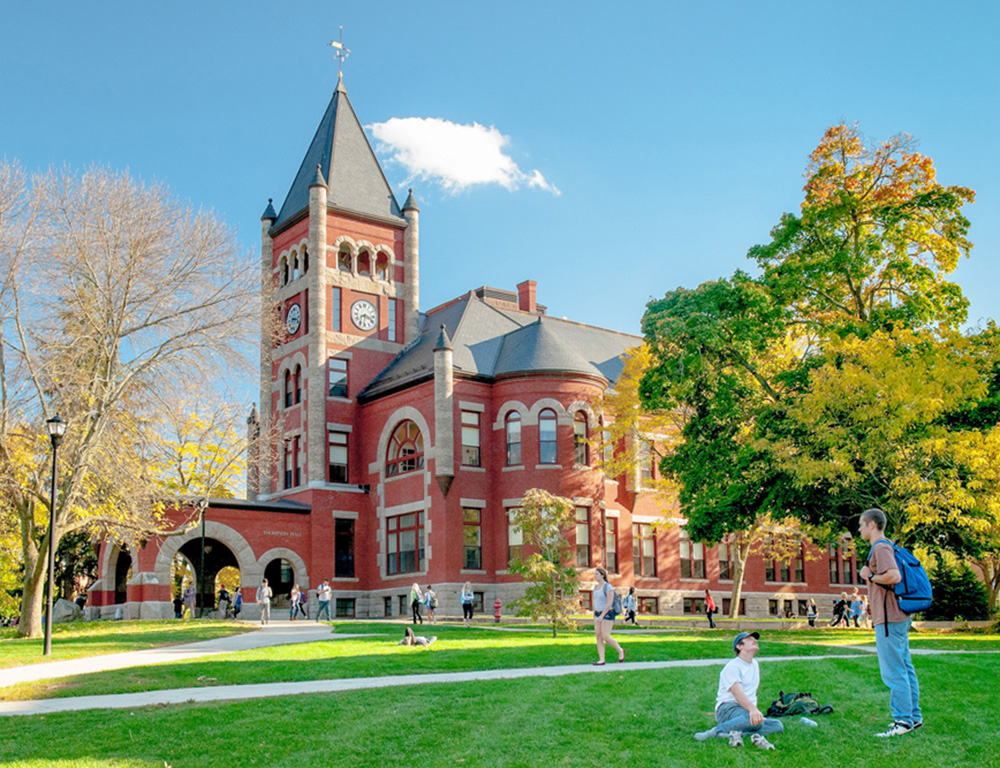-
-
-
Carmela Amato-Wierda
ASSOCIATE PROFESSOR -
Erik Berda
PROFESSOR -
Olof Echt
PROFESSOR EMERITUS -
Todd Gross
Professor Emeritus -
Brad Kinsey
Associate Dean, CEPS -
Igor Tsukrov
PROFESSOR -
Jiadong Zang
Professor
Materials Science (M.S.)
Materials Science (M.S.)

Why get a master’s degree in materials science?
Graduate students in the materials science program at UNH benefit from studying in interdisciplinary fields drawing from faculty representing seven different departments in science and engineering disciplines. Students gain versatile experiences attractive to a wide range of industries. The degree is a unique combination of both fundamental science and engineering, preparing students to tackle technical problems from a materials perspective in fields such as sustainable energy, sustainable and biodegradable materials, stimuli responsive coatings, and advanced electronic materials. The M.S. and Ph.D. in materials science and engineering degrees are truly sought after and can open more doors to opportunities than traditional single-discipline degrees.
Why choose UNH’s materials science program (MSP)?
Our materials science program offers unique experiences. Research can be conducted under a single faculty member, however, in many cases several faculty collaborate from different disciplines. Past and current students have had the chance to contribute to materials critical to space telescopes with farther reach than the Hubble, novel materials from boron nitride and the opportunity to work with local companies, as well as the newly formed biomaterials research center (NH BioMADE) with research in prosthetics, tissue engineering and biosensors.
Potential careers
- Advanced electronics
- Advanced manufacturing
- Biomaterials and biosensors
- Materials physics
- Nanotechnology and nanomaterials
- Professor in academia
- Research scientist
- Sustainable energy
- Theoretical computation
Contact
Curriculum & Requirements
Beginning in the 2023-2024 academic year, the Master or Science in Materials Science will no longer be accepting new students. Current students will continue to have access to the same high-quality education and resources until they graduate.
We offer degrees to qualified students interested in interdisciplinary research with an emphasis on the synthesis, characterization and utilization of nanoscale materials. All MSP students learn about the interplay of structure, processing, characterization, and properties of materials with useful applications. Our seventeen faculty members are active collaborators with research and development groups located around the world, and are experienced in managing research projects with practical results. Graduates of our program work in research, engineering and process development positions in a variety of fields.
Degree Requirements
The Master’s Thesis Option requires a total of 30 credits, which include 24 course credits and 6 thesis credits (MS 899 Master's Thesis). At least 6 credits must be at the 900 level.
The Master’s Project Option also requires a total of 30 credits, which includes 27 course credits and 3 master's project credits . The project may be theoretically or experimentally based but will be significantly less intensive than a thesis. The project will be defined and evaluated by the student’s advisor. At least 6 credits of coursework must be at the 900 level. The remaining course requirements are the same as that of the Master’s Thesis Option.
| Code | Title | Credits |
|---|---|---|
| MS 960 | Thermodynamics and Kinetics of Materials I | 3 |
| MS #961 | Thermodynamics and Kinetics of Materials II | 3 |
| Select one course each satisfying the following areas: | 9-12 | |
Synthesis and processing | ||
Characterization | ||
Structure-property relationships | ||
| MS 900 | Seminar (two semesters) | 2 |
| Select one of the following options: | ||
Thesis Option: | ||
MS 899 | Master's Thesis | |
Select one additional elective | ||
Project Option: | ||
Master's Project | ||
Select two additional electives | ||
Students who have done graduate work at other schools that included courses similar to those in the Materials Science Program may petition for waivers of UNH degree requirements. Other courses that may count as electives in the Materials Science Program are taught by faculty in chemistry, mechanical engineering, physics, and other departments. For a complete list of these courses, please see the Graduate Student Handbook on the materials science website.
- Students will understand the nature of the atomic-level structures found in metals, ceramics, polymers and semiconductors.
- Students will learn the principles of diffusion and be competent in solving non-steady state diffusion problems.
- Students will master the concepts of phase transformations and have an in-depth understanding the principles of nucleation and growth and continuous phase transitions.
- Students will be competent at analyzing and deriving phase diagrams.
- Students will obtain in-depth knowledge in the areas of materials characterization and materials processing.
- Students will develop specialized knowledge in structure-property relationships in materials in either metallic materials, polymers, composites or electronic materials.
- Students will be well prepared for further studies in Materials Science or careers in industry or government laboratories.
- Students will be able to present new scientific research findings effectively in both written and oral form.
Deadlines
Applications must be completed by the following deadlines in order to be reviewed for admission:
- Fall: Program has been suspended
- Spring: Program has been suspended
- Summer: Program has been suspended
- Special: N/A
Application fee: $65
Campus: Durham
New England Regional: MA RI
Accelerated Masters Eligible: No
New Hampshire Residents
Students claiming in-state residency must also submit a Proof of Residence Form. This form is not required to complete your application, but you will need to submit it after you are offered admission or you will not be able to register for classes.
Transcripts
If you attended UNH or Granite State College (GSC) after September 1, 1991, and have indicated so on your online application, we will retrieve your transcript internally; this includes UNH-Durham, UNH-Manchester, UNH Non-Degree work and GSC.
If you did not attend UNH, or attended prior to September 1, 1991, then you must upload a copy (PDF) of your transcript in the application form. International transcripts must be translated into English.
If admitted, you must then request an official transcript be sent directly to our office from the Registrar's Office of each college/university attended. We accept transcripts both electronically and in hard copy:
- Electronic Transcripts: Please have your institution send the transcript directly to grad.school@unh.edu. Please note that we can only accept copies sent directly from the institution.
- Paper Transcripts: Please send hard copies of transcripts to: UNH Graduate School, Thompson Hall- 105 Main Street, Durham, NH 03824. You may request transcripts be sent to us directly from the institution or you may send them yourself as long as they remain sealed in the original university envelope.
Transcripts from all previous post-secondary institutions must be submitted and applicants must disclose any previous academic or disciplinary sanctions that resulted in their temporary or permanent separation from a previous post-secondary institution. If it is found that previous academic or disciplinary separations were not disclosed, applicants may face denial and admitted students may face dismissal from their academic program.
Letters of recommendation: 3 required
Recommendation letters submitted by relatives or friends, as well as letters older than one year, will not be accepted.
Test Scores: GRE Required
GRE required. Request official test scores to be sent directly to the Graduate School by the testing service. Test scores more than five years old are not acceptable. Student copies and photo copies of scores are not considered official. Our CEEB code is 3918.
For general information about test scores, including waiver requests and current COVID related impacts, please visit our Test Scores webpage.
Personal Statement/Essay Questions
Prepare a brief but careful statement regarding:
- Reasons you wish to do graduate work in this field, including your immediate and long-range objectives.
- Your specific research or professional interest and experiences in this field.
Additional Department Requirements:
Accelerated Master's program only open to select group of current UNH undergraduate students. Criteria eligibility is as follows: Applicants must apply during Spring semester of their Junior year; Only open to students in a Bachelor of Science program/Materials Science Option within the Physics program; Have a cumulative GPA of 3.2 or higher; Check with program for GRE requirement
Important Notes
All applicants are encouraged to contact programs directly to discuss program-specific application questions.
International Applicants
Prospective international students are required to submit TOEFL, IELTS, or equivalent examination scores. English Language Exams may be waived if English is your first language. If you wish to request a waiver, then please visit our Test Scores webpage for more information.














